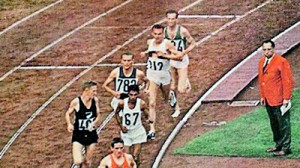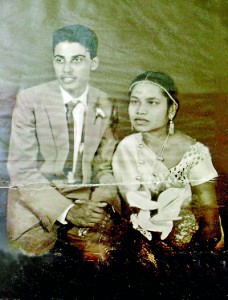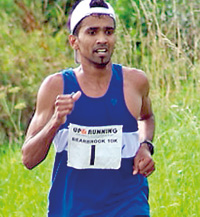The inside story of Karu’s legend
The 2012 London Olympics is over and apart from a few ardent followers, many have already forgotten the episodes of the most anticipated international sporting event. For most Sri Lankans everyday life is so eventful that it prompts many to forget what happened a minute ago; recalling names like R.K.J. Karunananda or just ‘Karu’ could only create an uninspiring oddity.

‘Karu’ No 67 is among the winners of the 10000metre event. But, in reality he was being lapped four times over. But, what heppened at the end of the race is the legend.
Karunananda is just another forgotten man to Sri Lankans but in Japan he is still remembered as a hero, who changes thousands of young lives with determination, courage, commitment and motivation. For those who have come across the name Ranatunga Koralage Jayasekara (R.K.J.) Karunananda for the first time in their lives, he was a long distance runner who represented Sri Lanka during the 1960s and 70s. He worked as an officer for the Sri Lanka Army and was a keen athlete who always stood and competed with real sportsmanship.
Karunananda earned the tag of being ‘the most spirited loser’ in the world of athletics for what he accomplished at the Tokyo Olympics in 1968. He competed in the men’s 10000m run and finished last but won the hearts of millions of Japanese viewers for what he did.
Karunananda was the only athlete of a 1968 Sri Lankan Olympic contingent which featured shooters Ravi Jayawardene and M.R. Perera, boxers Malcolm Bulner and Winston Van Keylenburg, and wrestler Ernest Fernando. The team was managed by V.A. Sugathadasa.
The date was October 14, 1968 and 29 athletes from 17 nations entered the 10000m event where Karunaratne was also a runner at the Tokyo Olympics. The 25-lap race preceded gradually with Karunananda being lapped by race leaders Billy Mills of the United States, Mohammed Gammoudi of Tunisia, Ron Clarke of Australia, Mamo Wolde of Ethiopia, Leonid Ivanov of the Soviet Union and Kôkichi Tsuburaya of Japan after 10 rounds. As the race reached its 20th lap, Karunananda further moved to the back. Interestingly he was with the top finishers when American Billy Mills won the gold medal after establishing a new Olympic record but was four laps behind.

Karunananda’s wedding photograph
The race was now over and the marshals were getting ready for the next event but Karunananda was still running. He could have stopped at any point as he had four laps to complete. But he continued and the crowd responded with sarcastic smiles and mocks. Karunananda determinedly kept on running not knowing that these four laps would create history and make him a legend. As he completed the second lap the Japanese spectators began cheering and by the time he completed the race it was historical. The whole stadium or the 60,000 spectators offered him a standing ovation with a thundering applause for the feat which will be a rare occurrence nowadays.
Japan embraced his effort and within a matter of hours Karunananda was a hero for them. He was the cynosure of pressmen than the 10000m gold medal winner Mills who later said that Karunananda was the true winner of the race.
One of the first to grab an opportunity for a chat with Karunananda soon after the race was Japanese reporter Haruo Suzuki. Suzuki took Karunananda out and introduced him to top social and political figures of Japan who in return entered his great feat into Japanese textbooks. To date Japan continues to relate Karunananda’s feat to their younger generation motivating them while thanking their Sri Lankan friend of the impression left, even years after his fateful demise.
But Karunananda’s native country Sri Lanka failed him and continues to do so in many ways. This was revealed to the Sunday Times by his family members. According to Nelum Priyadarshani, Karunananda’s only daughter, in 1996, Japanese television station NHK had come down to Sri Lanka to record a documentary about the legendary runner.
“This was the first time the media came out to do any sort of feature about my father, and it was all the way from Japan. The NHK as part of their 100th year celebration did a documentary in Kandy, the hometown of our parents. The following year after seeing the video, a group of benefactors have shown their interest to support my mother, brother and myself. Since they couldn’t find our whereabouts they had contacted the Ministry of Sports here,” Nelum said.
In 1997, local newspapers carried a news item stating that the Ministry of Sports, which was under the minister S.B. Dissanayake then, was looking for Karunananda’s family members. In response, Karunananda’s only son Channa Dharshanapriya had taken a file containing all supporting documents to verify the authenticity of the relationship and have met the sports minister. But Dharshanapriya, a teacher, had to expect the expected from the minister’s high tone of voice.
“He told ‘Thamuse neweine diwwe. Thamusege thaththa ne diwwe’ (Was it you who ran. Your father is the one who did it) and thrown back the file at him. And he has told my brother to send my father,” Nelum added.
What the then sports minister meant with his statement is only known to him. So ended the first and only call by a Sri Lankan authority on Karunananda in a meaningless fashion. But the said endowments received from Japan, only god knows what happened to them. “We never bothered even to find out what we received from Japan. Since we lost our father for 22 years three of us survived and nobody bothered or knew about us. So it was not a calamity comparing with what we went through,” a grieve-stricken Nelum said.
In 1975, Karunananda and his family were due to immigrate to Japan on a scholarship and one of the key characters who worked hard to obtain the former Sri Lanka marathon champion was the Japanese reporter Haruo Suzuki. Both Karunananda and Suzuki were ‘pen pals’. But tragically fortunes faced a strange fluctuation when Karunananda mysteriously ended his life after drowning in the Namal Oya tank. The nature of his death is still a mystery as some say he was murdered while others say it was an accident. After this incident Karunananda’s wife lost her mind and the family was forced onto the streets.
“An aunt came forward to help us. She looked after us and helped us raise our heads back.
The only retrieve we had was my father’s pension which my mother still gets. We did out studies and settled down in life but my mother’s psychological state still remains the same. She lives with me in Nattandiya but is still under the impression that we are leaving for Japan,” Nelum who is married with two kids revealed some unknown facts. Last year Karunananda’s pen pal Suzuki who is in his early 70s visited Sri Lanka to meet his courageous friend’s kith and kin. During Suzuki’s emotional visit he met Karunananda’s family. Suzuki also handed some cuttings of newspaper articles, pictures and videos of the courageous runner to the National Olympic Committee officials who too were initially clueless about a Karunananda who achieved a somewhat different feat at an Olympic.
According to a statement made by Suzuki, Karunananda had told the reporters in 1968 that “Sri Lanka is a sporty nation and I too come from there. We are here to compete with true sportsmanship and only not to win. We proudly can say that we managed to preserve the true Olympic spirit”.
Karunananda could be termed as an unsung hero of Sri Lankan athletics, a rare desertion of the then local media and a forgotten, leave alone the word hero, a citizen.
Japan embraced his act, made use of it for generations and venerated Karunananda with a hero’s title. They still continue remember him. But for many in Sri Lanka Karunananda’s name still remains to be a clue.
Follow @timesonlinelk
comments powered by Disqus


























